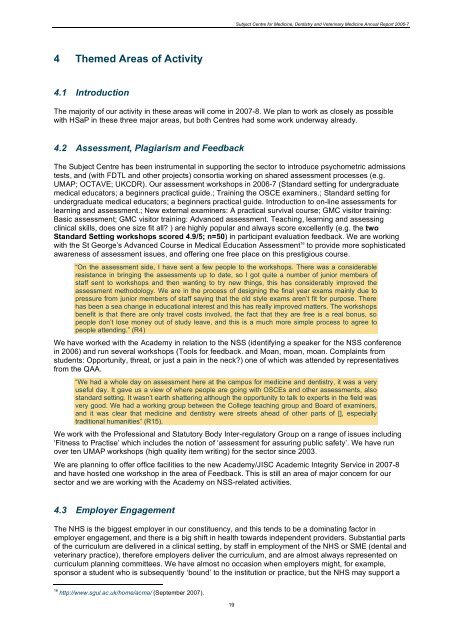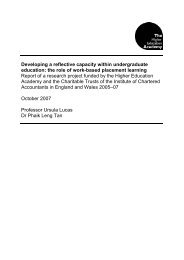Create successful ePaper yourself
Turn your PDF publications into a flip-book with our unique Google optimized e-Paper software.
Subject Centre for Medicine, Dentistry and Veterinary Medicine Annual Report 2006-7<br />
4 Themed Areas of Activity<br />
4.1 Introduction<br />
The majority of our activity in these areas will come in 2007-8. We plan to work as closely as possible<br />
with HSaP in these three major areas, but both Centres had some work underway already.<br />
4.2 Assessment, Plagiarism and Feedback<br />
The Subject Centre has been instrumental in supporting the sector to introduce psychometric admissions<br />
tests, and (with FDTL and other projects) consortia working on shared assessment processes (e.g.<br />
UMAP; OCTAVE; UKCDR). Our assessment workshops in 2006-7 (Standard setting for undergraduate<br />
medical educators; a beginners practical guide.; Training the OSCE examiners.; Standard setting for<br />
undergraduate medical educators; a beginners practical guide. Introduction to on-line assessments for<br />
learning and assessment.; New external examiners: A practical survival course; GMC visitor training:<br />
Basic assessment; GMC visitor training: Advanced assessment. Teaching, learning and assessing<br />
clinical skills, does one size fit all? ) are highly popular and always score excellently (e.g. the two<br />
Standard Setting workshops scored 4.9/5; n=50) in participant evaluation feedback. We are working<br />
with the St George’s Advanced Course in Medical <strong>Education</strong> Assessment 16 to provide more sophisticated<br />
awareness of assessment issues, and offering one free place on this prestigious course.<br />
“On the assessment side, I have sent a few people to the workshops. There was a considerable<br />
resistance in bringing the assessments up to date, so I got quite a number of junior members of<br />
staff sent to workshops and then wanting to try new things, this has considerably improved the<br />
assessment methodology. We are in the process of designing the final year exams mainly due to<br />
pressure from junior members of staff saying that the old style exams aren’t fit for purpose. There<br />
has been a sea change in educational interest and this has really improved matters. The workshops<br />
benefit is that there are only travel costs involved, the fact that they are free is a real bonus, so<br />
people don’t lose money out of study leave, and this is a much more simple process to agree to<br />
people attending.” (R4)<br />
We have worked with the <strong>Academy</strong> in relation to the NSS (identifying a speaker for the NSS conference<br />
in 2006) and run several workshops (Tools for feedback. and Moan, moan, moan. Complaints from<br />
students: Opportunity, threat, or just a pain in the neck?) one of which was attended by representatives<br />
from the QAA.<br />
“We had a whole day on assessment here at the campus for medicine and dentistry, it was a very<br />
useful day. It gave us a view of where people are going with OSCEs and other assessments, also<br />
standard setting. It wasn’t earth shattering although the opportunity to talk to experts in the field was<br />
very good. We had a working group between the College teaching group and Board of examiners,<br />
and it was clear that medicine and dentistry were streets ahead of other parts of [], especially<br />
traditional humanities” (R15).<br />
We work with the Professional and Statutory Body Inter-regulatory Group on a range of issues including<br />
‘Fitness to Practise’ which includes the notion of ‘assessment for assuring public safety’. We have run<br />
over ten UMAP workshops (high quality item writing) for the sector since 2003.<br />
We are planning to offer office facilities to the new <strong>Academy</strong>/JISC Academic Integrity Service in 2007-8<br />
and have hosted one workshop in the area of Feedback. This is still an area of major concern for our<br />
sector and we are working with the <strong>Academy</strong> on NSS-related activities.<br />
4.3 Employer Engagement<br />
The NHS is the biggest employer in our constituency, and this tends to be a dominating factor in<br />
employer engagement, and there is a big shift in health towards independent providers. Substantial parts<br />
of the curriculum are delivered in a clinical setting, by staff in employment of the NHS or SME (dental and<br />
veterinary practice), therefore employers deliver the curriculum, and are almost always represented on<br />
curriculum planning committees. We have almost no occasion when employers might, for example,<br />
sponsor a student who is subsequently ‘bound’ to the institution or practice, but the NHS may support a<br />
16<br />
http://www.sgul.ac.uk/home/acma/ (September 2007).<br />
19



